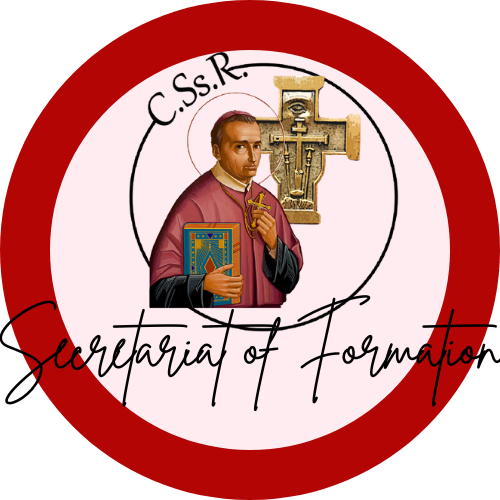Some Elements to be considered
Some Elements to be considered in the establishment of the program for the Pastoral Experience Stage
- References:
- Holy Bible
- Constitutions and Statutes CSsR (Rome 2002; (St:058) – Topical Index; Pastoral pp. 306-307; Formation pp. 279-281)
- Ratio Formationis C.Ss.R. reminds us that during formation we must “provide progressive forms (appropriate to each level) of well structured, guided apostolic experience (i.e. with preparation, actualization and evaluation). The particular ratios of the (vice) Province shall indicate more concrete procedures about this for each level of formation.
- Alphonsian Tradition
- Life and Ministry of the Saints and Blesseds
- General Government Decree on Formation, 2015
- The decisions of the XXIV General Chapter. (Profile of the Redemptorist confrere shaped by this new vision”. Accordingly, 6.16 states: “(…) He will need to have a wider grasp of the changing circumstances, human realities and apostolic priorities not only of his Unit but of the entire Conference to which his Unit belongs. He will, for example, have to learn about the phenomenon of migrants within the geographic area of his Conference. He will, to give another example, be able to participate in the ministry of Redemptorist shrines within his Conference, a ministry growing in importance within the modern phenomenon of popular religious devotion.” Also decision No. 6.17 will be more easily achieved. “Above all, he will know that he belongs to and willingly participates in the mission of a world‐wide Congregation that takes seriously the challenge of being alert to the signs of the times, and making vital apostolic decisions that respond ever anew to our call to mission.”)
- Some theological education in preparation (question about interrupting course of theological study)
- Preparation before the Pastoral Experience Stage
- May require language or other types of preparation depending on the place
- Introduction to the anthropology of the ministerial endeavor.
- Preparation of the person and of the community.
- Members will try to develop these initial sketches of programs by studying other programs (theology stage; Davao, Burkina, Bogotá, Warsaw, Denver).
Direct preparation:
- The formation director will write to those concerned (Major Superior of the Unit as well as the Major Superior of the host Unit as well as the Local Superior) setting out:
- the terms of the appointment, providing a profile of the confrere concerned
- stipulating clearly the expectations of the Program, in terms of community life, growth in faith, personal development and pastoral/missionary experience.
- to state the dates on which the pastoral experience stage begins and ends.
- Before the period of pastoral experience begins, the formation director will meet with the mentor/supervisor and the junior confrere to work out the concrete expectations, goals and objectives of the program for the person concerned.
- There will also be a meeting with the local Redemptorist community to discuss the Program, its goals, and the implications for the local community.
- Period of Time:
It will be one continuous period of no less than six months: “The General Government mandates that THE PASTORAL EXPERIENCE STAGE is part of initial formation for the entire Congregation. The Pastoral Experience Stage will be done during the period in which the confrere is in Temporary Vows and will be one continuous period of no less than six months.” Effective from 2016.
This stage of formation may be prolonged for one reason or another by the Major Superior on the recommendation of the Program Supervisor and/or Formator concerned or on request by the formandi himself. However, care should be taken to avoid the unnecessary prolonging of the period of initial formation.
- When (stage of formation):
Ratio Formationis Generalis 2003 (48) suggests that: “It is highly recommended that candidates, prior to final profession, have a well-planned supervised one-year pastoral experience.”
- Objectives of Pastoral Experience Stage
Expected Results
Pastoral Experience Stage should result in a healthy integration of the three essential elements/dimensions of Redemptorist life: Mission, Community; Dedication to Christ the Redeemer.
Specific Objectives from the Ratio Formationis Generalis 2003, No. 48: To help candidates broaden their capacity:
- to assume responsibility,
- to adapt themselves to the circumstances in which they find themselves, something that requires flexibility and courage in times of difficulty,
- to receive strong convictions and identification with the apostolic project,
- to maintain good personal relationships with the different people they meet.
Others specific goals:
For Personal Dimension
- personal growth in responding to the call of God according to the charism and ideas of the Congregation.
- becoming sure of his vocation.
- to learn how to cope with: leisure; the use of money, the responsible use of the Internet, lifestyle.
For Spiritual Dimension
- spiritual growth that reflects that the confrere undertaking the Pastoral Program is a Religious. The endeavors of the confrere in this area are assisted by a spiritual director.
- Prayer
For Community Life dimension
- to consolidate sense of community and co-responsibility in different settings
- an appreciation of the older confreres and an ability to understand their concerns
- giving the confrere the opportunity to get to know the confreres and vice-versa.
For Academic Dimension
- in many cases today, our younger confreres attend academic institutions which are not controlled or influenced by the Congregation. For this reason, it is essential that every Pastoral Program within the overall Formation Program of the Unit(s) should indicate the additional courses to be undertaken when our students are attending non-Redemptorist academic institution.
- Every opportunity to learn languages that will be useful both in their ministry and also in their life within the Congregation should be encouraged.
For Pastoral Ministry:
- to prepare formandi for future pastoral ministry (to development of pastoral skills in an intensive way) coming to know the concrete pastoral works of the Congregation and enabling the confrere to see his future tasks and duties;
- to grow in his ability to take on leadership roles, to work as a member of a pastoral team and to a greater awareness of his own talents and limitations
- involvement in the life of the Local Church, so that they will be aware of the various pastoral priorities and activities of the dioceses in which they will function
- To prepare formandi in the importance of collaborating with the laity (exposure to active collaboration with our lay partners and associates);
Important:
It is also important that regular periods of rest, reflection and prayer should be provided during the course of the Program.
- Locations: Where are the best places for the Pastoral Experience Stage?
Priorities of the Units and Conference need to guide location of pastoral experience. Normally pastoral experiences should be undertaken in the context of:
- our missions,
- parishes,
- special Redemptorist activities in the Unit or abroad.
- initial formation should endeavor to reflect the international character of the Congregation. It should help prompt the formandi to widen their sense of belonging to the whole Redemptorist family. It should stimulate in them an availability for mission which goes beyond their original Unit.
- preference should be given to the pastoral experience stage of formation being undertaken in a Unit other than the Mother-Unit and in an interprovincial community. The new structure of Conference in the Congregation could facilitate this more easily.
- Accompaniment
- The formation director – is the person responsible for the formandi. During the pastoral experience stage of formation, the formation director guides the confrere in formulating realistic yet challenging goals related to the important areas of that confrere’s life.
- Mentor/Supervisor – a member of the local community to which the confrere in formation is assigned for this experience. The mentor /supervisor will meet more formally at least once a month with the confrere under his supervision. The mentor/supervisor will help him integrate his faith, work, community life, prayer and leisure into the life of the apostolic community to which he is assigned. He also helps the candidate to evaluate his ministry, his ability to work as a member of a team, and his readiness for perpetual vows. Throughout the time of the pastoral experience the mentor/supervisor and the formation director will be in regular contact. The mentor/supervisor can also call on others to assist in the task of mentoring and supervising
- Spiritual Director – The endeavors of the confrere are assisted by a spiritual director (the spiritual growth that reflects that the confrere undertaking the Pastoral Program is a Religious).
- Others – While the Program is the direct responsibility of the formator, others will play important roles in the realization of the Program, including, the parish priest/mission coordinator of the team to which the confrere is assigned, the professors, spiritual director, and the members of the local community. The success of the Program depends very much on their cooperation.
- Evaluation
- Two or three times during the Pastoral Experience Stage there should be a review which offers the confrere concerned the opportunity to reflect on his experience and to receive feedback from those involved with him.
- At the end of the Program, the supervisor is expected to provide the formation director with a written evaluation. Guide questions for these evaluations will be provided by the formation director.
- Members of the local faith community in which the confrere is ministering should also be called on to participate in evaluating the confrere’s readiness for ministry.
- Any reports from those among whom and with whom the candidate has ministered.
- Where possible and advisable, some form of peer evaluation should also be taken into account.
- Together with these reports, the written evaluation by the candidate himself (including reflection on his growth in all aspects of his life) will be of great value.
- Methodology of the work:
Depends on the specific pastoral engagement.
- Lectures:
- The life and work of our saints and blessed Redemptorists
– Selection of readings from the bibliography presented by the General Secretariat of
Formation, 2020.








